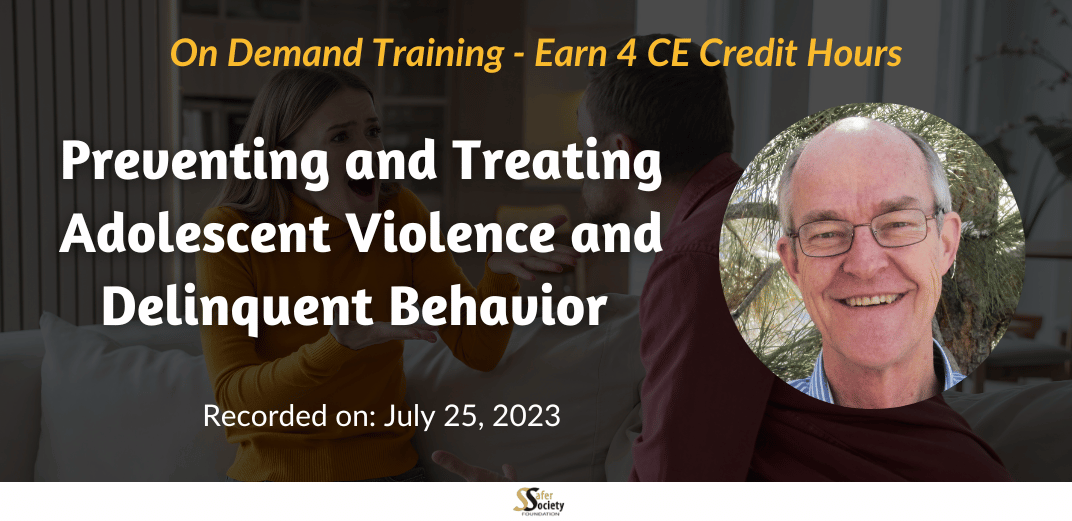
Preventing and Treating Adolescent Violence and Delinquent Behavior
Already purchased an On Demand training?
Click here to access your Safer Society On-Demand Training Center account.
This training provides insight into how and why some adolescents engage in violence and other delinquent behavior. Presenter Tom Leversee describes empirically based pathways to offending and examines its sociocultural context, specifically addressing how individual development unfolds within an ecological niche and how this affects behaviors such as juvenile delinquency and violence.
Key topics discussed include:
- Key lessons from the history of preventing youth violence and crime
- Understanding the origins of youth violence and crime
- Risk Factors for offending and re-offending
- Assessment processes in the juvenile justice system
- The principles of risk, need, and responsivity
- What works in intervention and prevention
- Future trends in research and practice
Tom Leversee reviews assessments in juvenile justice systems, especially as they relate to treatment and supervision in community and institutional settings. The risk, need, and responsivity principles of effective correctional rehabilitation are closely examined, along with dynamic risk factors and associated behavioral indicators across the key domains of development—the individual, the peer group, the family and school environment, and the community beyond. Leversee also reviews effective and promising approaches to preventing delinquency and violent behavior as well as treatment strategies for working with offending juveniles, using numerous case examples to illustrate the key points.
1) Explain the onset, maintenance, and desistance from adolescent violence and delinquent behavior.
2) List the dynamic risk factors and behavioral indicators associated with delinquency and youth violence.
3) Describe principles involved in assessing clients in the juvenile justice system.
4) Describe evidence-based primary, secondary, and tertiary interventions to address delinquency and youth violence.
5) Explain the principles of risk, need, and responsivity.
Audience
This training is primarily for professionals involved in the juvenile justice system and those working with juveniles in clinical settings. This includes practitioners, judicial officers, and mental health professionals.
Content Level
Disclosure
Continuing Education Approval
American Psychological Association (APA)
Safer Society Foundation, Inc. is approved by the American Psychological Association (APA) to sponsor continuing education for psychologists. Safer Society Foundation, Inc. maintains responsibility for this program and its content.
Who's Presenting

Tom Leversee, LCSW
Tom Leversee, LCSW, worked for 34 years in direct care, clinical work, supervision and management, and administrative positions in the Colorado Division of Youth Corrections. He has extensive clinical experience with adolescents who have engaged in sexually abusive behavior and facilitated the Denver County Sexual Abuse Review Team. Tom currently has a private practice focused on consultation, training, and clinical services for adolescents. Tom has served on numerous occasions as an expert witness, with a recent focus on applying a neuroscience and psychosocial development framework to juvenile transfer hearings. Tom is also an adjunct professor at the University of Denver Graduate School of Social Work with courses focused on Delinquency and Youth Violence and Forensic Practice. Tom has numerous publications and has presented extensively nationally and internationally. He served on the state Sex Offender Management Board and on the Board for the Association for the Treatment and Prevention of Sexual Abuse.
